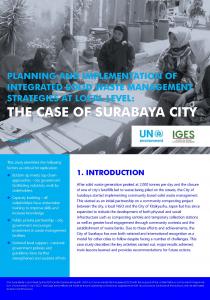After solid waste generation peaked at 2,000 tonnes per day and the closure of one of city’s landfills led to waste being piled on the streets, the City of Surabaya started implementing community based solid waste management. This started as an initial partnership on a community composting project between the city, a local NGO and the City of Kitakyushu, Japan but has since expanded to include the development of both physical and social infrastructure such as composting centres and temporary collection stations as well as greater local engagement through community contests and the establishment of waste banks. Due to these efforts and achievements, the City of Surabaya has won both national and international recognition as a model for other cities to follow despite facing a number of challenges. This case study describes the key activities carried out, major results achieved, main lessons learned and provides recommendations for future actions.
PLANNING AND IMPLEMENTATION OF INTEGRATED SOLID WASTE MANAGEMENT STRATEGIES AT LOCAL LEVEL: THE CASE OF SURABAYA CITY
- Authors
-
Simon GILBY, Matthew HENGESBAUGH, Premakumara Jagath Dickella GAMARALALAGE, Kazunobu ONOGAWA, Eddy S. SOEDJONO, Nurina FITRIANI
- Copyrights
-
UN Environment
- Publication Date
-

